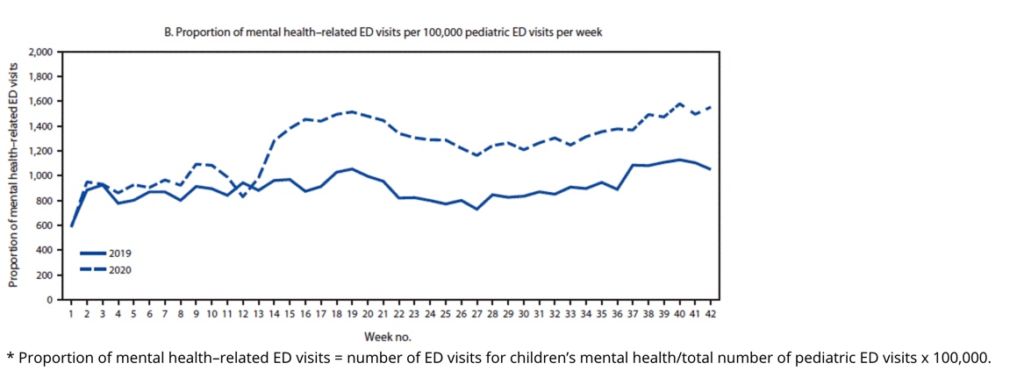More evidence shows that lockdowns have been detrimental to children’s mental health
On Nov. 13, the Center for Disease Control and Prevention (CDC) published a report showing trends in Mental health wellness in children during the Coronavirus pandemic. The report utilizes data on visits to the Emergency Department (ED), which tend to be children’s first point of contact, to analyze mental health visits among children. Evidence from the study suggests that the lockdown has had a negative impact on the mental health of children.
Generally, ED visits sharply declined in the period of Mid-March to Early April (potentially due to restrictions and closures to non-emergent care) and then increased afterward through the end of the reporting period (October 2020). However, in this same period, “the overall proportion of reported children’s ED visits for mental health-related concerns increased and remained higher through the end of the reporting period in 2020 than that in 2019.” Specifically,
The proportion of mental health–related ED visits among children increased 66%, from 1,094 per 100,000 during April 14–21, 2019 to 1,820 per 100,000 during April 12–18, 2020.

Source: CDC
Additionally, adolescents were the most impacted.
Adolescents aged 12–17 years accounted for the largest proportion of children’s mental health–related ED visits during 2019 and 2020. During weeks 12–42, 2020, the proportion of mental health–related visits for children aged 5–11 years and adolescents aged 12–17 years increased approximately 24% and 31%, respectively compared with those in 2019; the proportion of mental health–related visits for children aged 0–4 years remained similar in 2020. The highest weekly proportion of mental health–related ED visits occurred during October for children aged 5–11 years (week 42; 1,177 per 100,000) and during April (week 16) for adolescents aged 12–17 years (4,758 per 100,000).

This data shows that the Covid-19 pandemic and the shutdown that followed might have exacerbated mental disorders in children through “stress related to the pandemic and abrupt disruptions to daily life associated with mitigation efforts, including anxiety about illness, social isolation, and interrupted connectedness to school.”
Other reports
This is not the first report to show how detrimental the lockdown has been on kids. Many other reports have also shown evidence suggesting the Covid-19 period has been damaging to mental health.
Additionally, the kids have also not been the only ones affected. For instance, a Harvard study has found that more and more young people are showing symptoms of severe depression and having suicidal thoughts. As illustrated by Fee,
In the US adult population as a whole, the incidence of suicidal ideation typically hovers around 3.4 percent. But this new study reveals that in October, 36.9 percent of young adults had suicidal thoughts, compared to 32.2 percent in May in the wake of the first round of government lockdowns.
And in a new study on life satisfaction, authors Terrence C.Kim, Seonghoon Kim, and Kanghyock Koh found that Singapore experienced large declines in overall life satisfaction that coincided with the introduction of a national lockdown. And unfortunately, life satisfaction remained below its pre-pandemic levels even after the lockdown was lifted. Additionally, individuals who reported losing income experienced a decline in life satisfaction that was twice as large as those individuals that saw no change in income.
Overall, the lockdowns have been associated with disruptions that have been harmful to people’s well being. Children, however, are still developing, but have had most of their social ties cut from under them. This means that they a higher risk of developing mental health issues now and also in the future. They, therefore, stand to be the most severely impacted, now and in the long term.